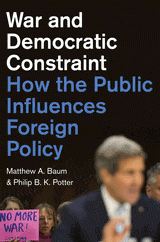 War and Democratic Constraint: How the Public Influences Foreign Policy, Matthew A. Baum and Philip B. K. Potter (Princeton: Princeton University Press, 2015), 280 pp., $29.95 paper.
War and Democratic Constraint: How the Public Influences Foreign Policy, Matthew A. Baum and Philip B. K. Potter (Princeton: Princeton University Press, 2015), 280 pp., $29.95 paper.
doi:10.1017/S0892679416000319
Democratic peace theory rests on the largely untested assumption that leaders of liberal democratic states will be held publicly accountable for the costs of war. In this new study, Baum and Potter argue that the degree to which democratic citizens can constrain their leaders’ foreign policy decisions depends on both the extent of robust political opposition and the freedom and accessibility of mass media. Neither of these conditions alone will suffice. According to the authors, it is necessary not only for a politically potent opposition to blow the whistle when leaders stray from the interests of their constituents and make risky foreign policy decisions but also for media and communications institutions to be able to convey these transgressions to the wider public, which in turn can punish leaders at the ballot box. In short, Baum and Potter identify the generation and transmission of information as the key mechanisms underlying democratic constraint.
The major contribution of this work lies in the rigorous empirical analysis employed to test this hypothesis.Marshaling an enormous amount of time-series, cross-sectional data from 1965 to 2006, the authors find that democracies with a higher number of political parties (a proxy for the extent of political opposition) and broad public access to mass media are less likely to become involved in international conflicts than democracies with a two-party system and limited media openness and accessibility. These results are confirmed using multiple datasets and alternative proxy variables, and replicated across foreign policy decisions ranging from conflict initiation to reciprocation and coalition forming.
In a time when democracy promotion is often justified on the promise of ensuring a safer world, Baum and Potter offer a crucial caveat: not all democracies are equally peaceful. Ultimately, their work highlights both the power and limitations of democratic peace. While citizens of democracies
can hold their leaders accountable in the realm of international affairs, this capacity is not guaranteed by free elections or rule of law. Democratic constraint can only exist in the presence of certain institutional arrangements—powerful political opposition and an independent media—that ensure a diverse framing of foreign policy issues and a free flow of information.
More in this issue

Fall 2016 (30.3) • Essay
Swedish Feminist Foreign Policy in the Making: Ethics, Politics, and Gender
In 2014 the world’s first self-defined feminist government was formed in Sweden. As part of that ambitious declaration, Sweden also became the first state ever ...
Fall 2016 (30.3) • Review
Can Microfinance Work? How to Improve Its Ethical Balance and Effectiveness by Lesley Sherratt
By 2009 the reckless greed of subprime mortgage lenders in the United States had become clear. Housing prices had collapsed by 30 percent or more, and families, ...
Fall 2016 (30.3) • Review
Realpolitik: A History by John Bew
Realpolitik is back—or if not back, at least enjoying a day in the sun more fully than it has for several decades. Chastened by ...